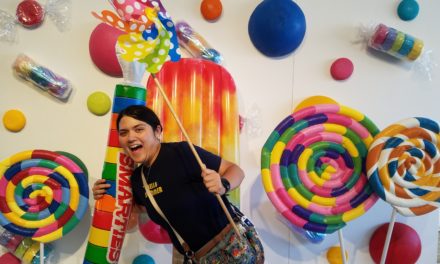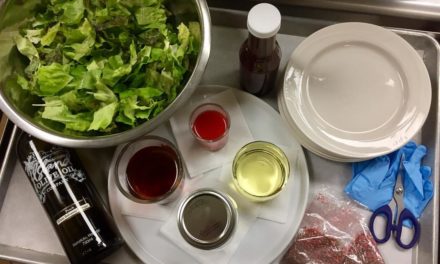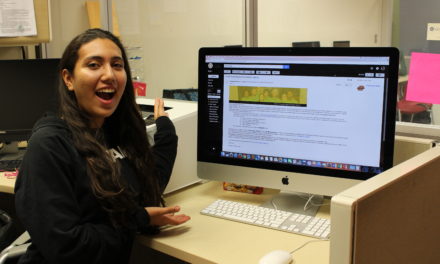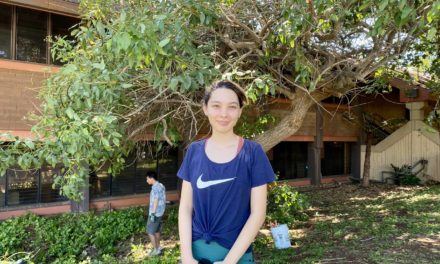By the Kapiʻo News Staff
Kapiʻolani Community College’s administrative staff has seen quite a bit of turnover in the last few years, so we thought it’d be good to get to know the people who run this school.
Louise Pagotto | Susan Kazama | Brenda Ivelisse | Brian Furuto | Nāwa’a Napoleon | Patricia O’Hagan | John Richards | Carol Hoshiko | Thomas No’eau Keopuhiwa
Louise Pagotto, Interim Chancellor, has been at KCC since the fall of 1989 and has been Interim Chancellor since June.
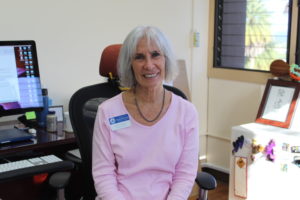
Louise Pagotto (Photo by Lexus Yamashiro)
Q: What is KCC’s strength?
A: The strengths are in the people and the programs. So, the faculty and staff that are here are super; they care about their students, they care about their disciplines and they’re excited to teach. They care about the services they provide for the students, and the programs that we offer are programs that are of benefits to students and the state.
Q: What advice would you give to students?
A: Probably the key to their success is the degree to which they are able to connect with their classmates, with the students who are in the same major, with the teachers, with the counselors, with … people in the library, the support staff because we know that when students feel connected with their institution, they stay better, they persist more. It’s easier to slip away when you’re not connected to anybody; you feel that nobody cares about you. “So what if you don’t go (to class)? Who cares?” But the more connections you make with classmates and others, then people will worry about you and say, “Hey, where were you? How come you didn’t come?” or “We had a meeting, you weren’t there, what’s going on?” So, for me it’s really important for students to develop those relationships because they matter; the students matter to us.
Q: What would you like to see change at KCC?
A: I would like to see more opportunities for student employment on the campus, because that’s another way that we can get students connected. I would like to see more opportunities for co-curricular activities for students, but … students have very busy lives. So we’re a commuter campus. People come here, they take classes, they go. I’d like to be able to offer them reasons to stay. And if we probably had more land and lots more money we’d do a fitness center and we’d do a health center and we’d do … sports and kinds of other things, which we don’t have the resources to do right now. And I’d like to see the buildings in tip-top shape and the classrooms be state of the art with the best kind (of) furniture and all that stuff, so what we do instead is we that we try to make sure that we develop community within the classroom because we are a commuter school. So while the students are in class together we try to build in those activities that connect the students and we offer them service-learning opportunities to go out of the classroom and keep learning with their classmates, internships to get into the workforce and test things out. So we also try to reach beyond the state, so we have – do I say “so” like a hundred thousand times, right? The campus has a very large population of international students and that is intentional. We do understand that international students bring a very different perspective to students here at the college and not everybody has a chance to travel, and this is like the next best thing, being able to talk to somebody about what is it like in Korea? Or what is it like in Indonesia? So I’m very pleased that the campus has that population here, and we do have opportunities for students to travel and do Study Abroad through the Freeman Project. If we had more opportunities that would be great, but there are some scholarships for Study Abroad, we have some.
**as told to Staff Writer Lexus Yamashiro
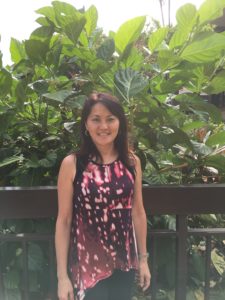
Susan Kazama (Photo by Kayla Valera)
Susan Kazama, Interim Vice Chancellor of Academics, has been at KCC first as a librarian in 2001 and as Vice Chancellor since July.
Q: What do you think is KCC’s strength?
A: I think the sense of community here. There’s a lot of people who are really dedicated. They’re people who fill in for jobs that’s not even in their area and scope and go above and beyond, and there’s a lot of examples of faculty who reach out to students and really wanna help. Every day I see that with the different faculty and a lot of the students that come in, you start saying, “Where do I go, how do I do this?” and everybody’s willing to help. So they see students as an individual, and that’s what I like about the community college. You’re not a number, you’re not a number 300 at Manoa. You’re not a part of this lecture lab where you mean nothing to the professor or the graduate assistant. Over here the faculty know your name. And it’s individuals, that’s what I like about it. Even though we’re big, you’re not a number, you’re still an individual.
Q: Do you have any advice to any students in general?
A: Use the Study Hub for tutoring. Use the computers and the wifi in the library. Don’t be afraid to ask your instructors for help. Just ask. It doesn’t hurt to ask, right? Never think that it’s a dumb question. (The students) should ask no matter what. If you don’t know or you don’t understand, it’s better that you ask so that the instructor can make it clear. If you don’t ask you don’t get, ever.
Q: What would you like to see change at KCC?
A: I don’t know, there are always so many ideas where to start (laughs). Food trucks … come bring the food trucks here (says jokingly).
**as told to Staff Writer Kayla Valera
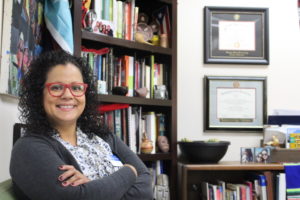
Brenda Ivelisse (Photo by Nakoa Nunies)
Brenda Ivelisse, Vice Chancellor of Students, has been at KCC since December 2014.
Q: What kind of strengths do you think KCC has?
A: I think one of the key strengths for KCC is its community, dedicated faculty and staff. What makes it fun is the students like yourself that really bring life to it. That’s what makes KCC very unique. I love the campus; it’s beautiful, it’s super beautiful. We have amazing students, amazing staff and faculty, (and) I love working here. The leadership is great. I’m excited about our new leadership. We have now an interim chancellor, Dr. Louise Pagotto. And she is just a breath of fresh air, and so it’s really great to work under her leadership and work with my colleagues. They’re really great as well. The aloha spirit is really alive here and so (it is) really great to be a part of that. It’s not just something you see on the side of a postcard or something that someone just casually says but we really care. We really enjoy each other.
Q: Do you have any advice for students?
A: I think one of the things that I would say is pursue their passion. A lot of students are really scared so they will do things that their parents want them to do or things that are convenient versus pursuing a passion. I want students to have careers not just jobs. A career is where you work really hard, and it doesn’t feel like working. A job is you check in and out. You’re in 9 to 5 and that’s it. I want students to follow their passion, what that means it’s gonna be a lot of work. Taking time to study, taking time to also just be present in the moment. I know a lot of folks forget to do that. They get so caught up in school that they forget to just take it in, and say “Hey, we’re in Hawaiʻi, we’re at Kapiʻolani, and there’s people here who are gonna be supportive of me.” Get plugged in and what I mean by that is get engaged in activities, whether it’s publications, student activities.
Q: What are some changes you want to see at KCC?
A: I want to see more student life. I want to see more of the publication out. I want to hear student voices more. I think that we do a good job, (but) I think we can definitely do better. We have lots of activities where students come out. I wanna see more of that.
**as told to Staff Writer Nakoa Nunies
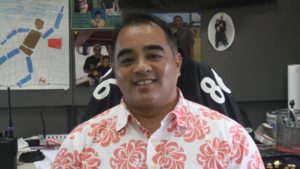
Brian Furuto (Photo by Gavin Arucan)
Brian Furuto, Vice Chancellor of Administrative Services, has been at KCC since 2013.
Q: What is KCC’s strength?
A: I always believe that in any organization, the greatest assets are the folks that work here. I think we have great students, and we have great employees. It’s a very stressful place to work, but it’s also very rewarding, and the people here are good people.
Q: What advice would you give to students?
A: The first piece of advice I would have for students is: College is more than just the books. College is about getting to know who you are as a person by interacting with other people. College is a great microcosm of society as a whole. Being in a protected and a safe environment, it teaches you a lot about who you are, how to get along with others, how to resolve problems, how to work hard and reach your goals. Again, it’s beyond just books. Get to know the people, get to know the people around you. The second piece of advice I would have is to not feel like you have to pigeonhole yourself into a major, into a course of study. I have a child in college right now. He just started this year. I’m not going to be real happy, obviously, if he takes five or six years to graduate, but if he takes that time to finish school and really get to know what he wants to do in life, I’d feel a lot better than him just saying, “OK, I’m going to do this,” and have to rush through it. Your course of study is your course of study. In the end you’re still a person and you need to do something that you’re going be passionate about. Having that passion is critical to whatever you’re going to end up doing.
Q: What would you like to see change at KCC?
A: As the Vice Chancellor of Admin Services, I’m in charge of a lot of different areas: security, facilities, HR, budget, business office. And in the end, I would really like to see us be able to get enough money from the system and from the legislature to fix our buildings and to maintain them. We do what we can to keep the campus safe, but there’s a lot of things we can and should do to make it a better place. We need enough funding to upkeep our facilities. … I enjoy doing this now because when I can get a project done for the students, such as the Kōpiko Courtyard or the ʻŌhiʻa, I know that the students are going to make good use of it. They’re going to enjoy it. Whether it’s a place to study or to hang out or to go to class, it’ll be a nicer place for them. I enjoy that part of my job. … Under facilities is all the construction projects, big and small. Obviously we don’t get a lot of new buildings so a lot of it is major repairs. This summer we had over 15 total projects, of which two are still going, and that’s the ʻŌhiʻa Auditorium and the Kōpiko Courtyard. It feels good because some of these projects you can’t even tell. A bet a lot of returning students didn’t even notice that we got new roofs on five of our buildings, but in the end it’s better for everybody, for the employees and the students because it looks nicer and it’s not going to leak. And we have our fair share of leaks. Very rarely do we get the chance to do game-changing projects like the Kōpiko Courtyard. When they’re done it’ll make a big difference for the students who use those buildings.
**as told to Staff Writer Gavin Arucan
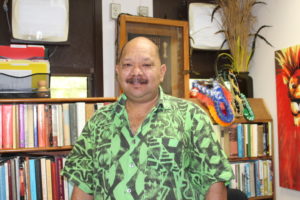
Nāwa’a Napoleon (Photo by Lexus Yamashiro)
Nāwaʻa Napoleon, Dean of Arts and Sciences, has been at KCC since 1991.
Q: What is KCC’s strength?
A: I think one of the strengths is that we carry the name of Queen Kapi‘olani, or that we just carry the name “Kapi‘olani,” which were two really prominent women in Hawaiian history. … The strength is really those two prominent women who (are) really guiding us. … They’re kind of using the campus as a vehicle to kind of propel what they tried to do while they were living. … So kind of their goals and aspirations and even though physically they’ve passed away, but I think spiritually they really support and live through not only what only the faculty and staff do but what students do as well. So you know we have a good nursing program and a good STEM program and I think Queen Kapi‘olani, she was really about helping her people who’ve, while she was living, a lot were dying of diseases that have come to the islands. So what I think that we do on campus has really reflected in the values of the people who have passed, especially the people who carry the name Kapi‘olani.
Q: What advice would you give to students?
A: So this is my advice as Nāwa‘a, not my advice as an administrator, and it’s really to follow their passion of what they want to do. Of course, you know, we’ll always say that school is important, your education is important, but you know, for me it’s really whatever makes you happy. Yeah, I mean, I’m glad I did get an education and go to school, but I look at my dad who never went to school, and his education is an education that no institution can actually offer because he learned through actually doing things like paddling and knowing the ocean. But I think for students just realizing, you know, what makes them happy and really following their gut feeling of just happiness and joy. … But sometimes it’s just good to take a year or four years off to just celebrate your accomplishment of making it through high school cause that’s … for me that was a big thing, and then I took off, just three months and just kind of jumped on a plane and went and travelled by myself, and then came back and I was ready to.
Q: What would you like to see change at KCC?
A: System-wide in the University of Hawai‘i system, there’s a document that outlines how the University of Hawai‘i system will be an indigenous serving institution. So, we’re slowly working our way towards that, but I think we really need to, when students come to our campus, really educate them and provide them the experiences or provide them with opportunities to truly understand Hawai‘i and the place we’re in. I think a lot of students who come from afar and they come here, they just see Hawai‘i as surfing, liberals. You know they forget that there’s people here where it’s really hard to live here, and we’re struggling for students to understand the history of the islands and just to have a deeper appreciation and understanding of Hawai‘i. Yeah so you know how we have these Hawaiian Asian Pacific Emphasis Courses, but that’s… just (the) surface of really what Hawai‘i is about.
**as told to Staff Writer Lexus Yamashiro
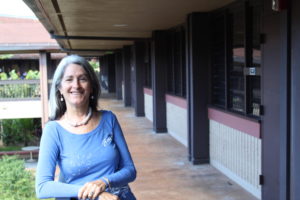
Patricia O’Hagan (Photo by Nakoa Nunies)
Patricia O’Hagan has been the dean of Health Academic Programs for seven years.
Q: What are KCC’s Strengths?
A: We are the only campus, in the university system of community colleges, that has a concentration in health programs, which are professional health academic programs in three different departments. We are the only community college that has radiology, respiratory, medical lab technician, occupational therapy assistance, and physical therapy assistant programs. We train all of the paramedics and emergency medical technicians for the state. We have one of the best ADN (Associate Degree in Nursing) programs in the state, and the pathway to get their BSM (Bachelor of Science in Nursing) at Mānoa. Other islands have nursing programs, but we offer more nursing programs than others. We don’t just offer that. We also have faculty for the EMS for training paramedics on Maui, the Big Island, and we have continued education on Kauaʻi. That what makes us different from every other community college.
Q: What advice do you have for the students attending KCC?
A: You’re here for two years of your life; it may seem like a little but it’s a substantial amount of time. Get involved as much as you can and come visit us. We are here at KCC walking around, and the administrators want to know how you’re doing. I go to the first-year classes and the graduating class, but as administrators we’re not in the classroom, even though I’d love to be. Whenever you see us or whenever you want to, come see us, talk to us, or have a tea with us. Get involved in your campus. I know that the Student Congress is much more active than they used to be. They’re really doing great things this year. And come up with ideas. If you have great ideas for getting people engaged, bring them forward. We’ll what we can do anytime. We’ll help you and participate.
Q: What would you like to see change at KCC?
A: You want every building to be shiny and new with the best technology, so that’s my dream. My other dream is that we build a state-of-the-art gym, that we have a state-of-the-art health center, that we have a state-of-the-art health science, nursing, and EMS building. Yeah, I have a lot of dreams, but they take a lot of money and a lot of planning and they take time. And it makes a lot of sense because we have a long-term care hospital across the street and we’re smack dab in the middle of a wonderful community that we can support.
**as told to Staff Writer Nakoa Nunies
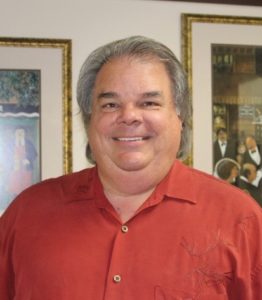
John Richards (Photo by Kayla Valera)
John Richards, Dean of Hospitality, Business and Legal Academic Programs, has been at KCC since January 2015.
Q: What is KCC’s strength?
A: The people. All people. Every institution like this has challenges but overall everybody I’ve met – whether they’re administers, faculty or staff or students – are just wonderful. That’s what stands out the most to me, and everybody pretty much wants to do excellent things.
Q: Do you have any advice to any students in general?
A: Right now I’m helping a group of students form a music club. This is something that they’ve wanted to do, they’ve tried to do but have not been able to do. And so I’ve listened to them and said, “Let me help, come to my office and I can help form the music club, get word out for the music club, find a place for them to meet, people to support it.” So you know we have our name badges here, and when I want to meet students I put that on and walk around and people see that I have that and they talk to me. When I don’t have that on they don’t know who I am so they don’t approach.
One of the things I miss the most is not being in the classroom with my students because that’s where the magic is. And I do my best job to support everybody. Support our students, anybody that walks through my door and says, “Hey I’d like to try this,” then that’s my mission. I work very hard to support the faculty in my department, and then I work very hard to support the administration. And they’re not always on the same page, but this is a great place. Great people. So I always look for reasons to engage with our students.
Q: What would you like to see change at KCC?
A: What I would like to say is that there’s been a lot of changes since last spring. …Well there was leadership change. A lot of people here shifted. Louise Pagatto is now our chancellor, Susan Kazma is now our Vice Chancellor, Nāwa’a Napoleon is now our Dean of Arts, so it’s a whole new makeup, and it’s just a new and exciting energy and it’s great. And we just need to find a way to make sure that it gets to the students, because that’s why they’re here. … And I’m just so excited to be here at this time as I watch the campus begin to soar. Everybody seems energized and open and optimistic, and very positive. So that’s what I’m sensing, and it’s a very good environment for us to make important changes, additions, and just the evolution of our campus.
**as told to Staff Writer Kayla Valera
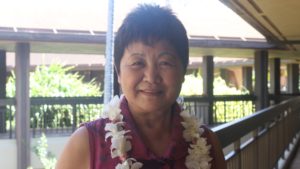
Carol Hoshiko (Photo by Gavin Arucan)
Carol Hoshiko, Dean of College and Community Relations, has been at KCC since 1994.
Q: What is KCC’s strength?
A: I think that KCC’s greatest strength are its students and its excellent faculty.
Q: What advice do you have for students?
A: To never give up. To believe in themselves, and to strive for the highest.
Q: What would you like to see change at KCC?
A: I would love to see us live our long-range development plan and to achieve our strategic plan goals. Some of those goals are to increase enrollment and to increase retention, completion, and so forth. You can find that strategic plan through the chancellor’s advisory committee. We had a vote, and we will be presenting that at the board of regents. It has been reviewed by all of the different committees on campus.
**as told to Staff Writer Gavin Arucan
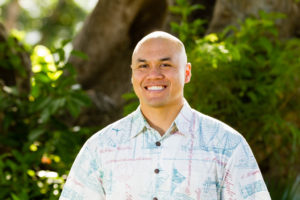
Thomas No’eau Keopuhiwa (Photo courtesy of No’eau Keopuhiwa)
Thomas No‘eau Keopuhiwa, Interim Student Affairs Coordinator, has been at KCC since December 2013.
Q: What is KCC’s strength?
A: With my experience here, one of the hidden strengths is the commitment to the student outside the classroom. We have a whole bunch of support programs ranging from support for Native Hawaiians, first-generation college students, income eligible. We have support programs for student parents, students with disabilities, veterans, the list goes on and on. Within that, I think we have really good student life programs and organizations, with the revival of the Kapiʻo (News), Board of Student Publications has a space now, Board of Student Activities, and Student Congress. Registered independent organizations such as the Economics and Business Club and the Bayanihan Club are just a few of the many we have on campus. The future looks bright for what I would call the hidden curriculum of the college.
Q: What advice would you give to students?
A: If I were to give advice back to myself when I first started, I think what I would do is not be afraid to share my story, my experience, ask the questions. Because I do think college comes with a lot of expectations that you should know these things, and if you don’t, you don’t belong here. So I would really advise a new student to talk with someone, talk with a peer, talk with a counselor, a coordinator, or anybody on campus, because many times the issues we face are faced by everyone else and we just don’t realize it. The college journey does not have to be completed alone. Our entire campus is here to support, guide, and ensure you achieve your goals.
Q: What would you like to see change at KCC?
A: Well, I do like the changes we have been making. If we look at the space where Kapiʻo is now (ʻIliahi), that downstairs area is all student engagement. There’s student activities, student publications, and Student Congress has a space there. I would like to know that students realize KCC has something to offer them to stay on campus. I realize we are a community college, we have commuters, but at the same time I think we can reach that population of students (who) would want a place to hang out on campus, to have that engagement. I would like students to know that learning takes place outside the classroom and our college provides those opportunities.
**as told to Staff Writer Chris Takahashi
These interviews have been lightly edited for length and clarity.

